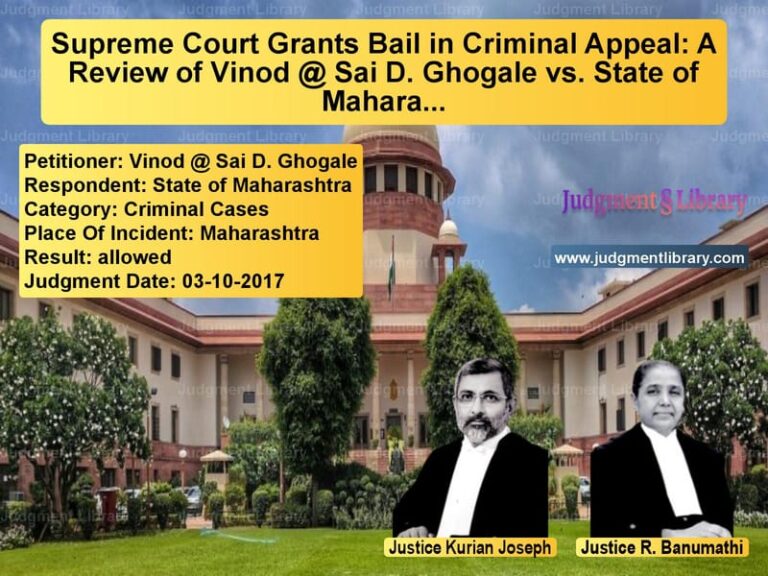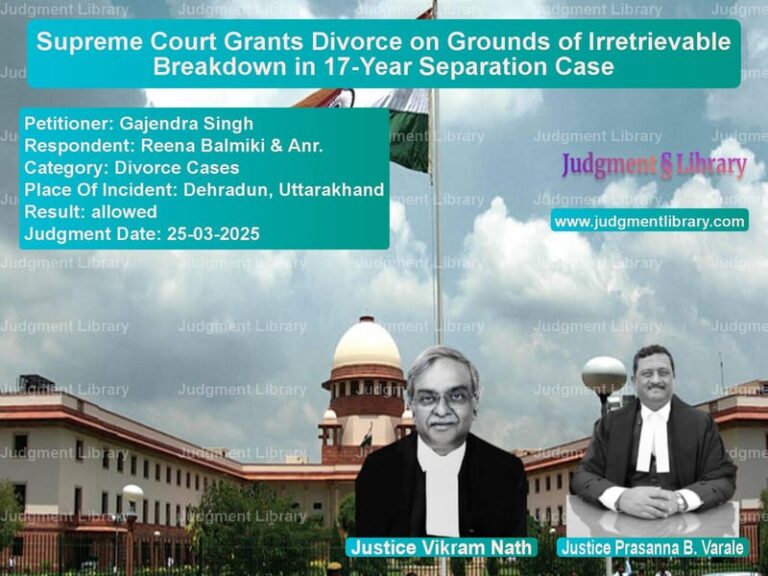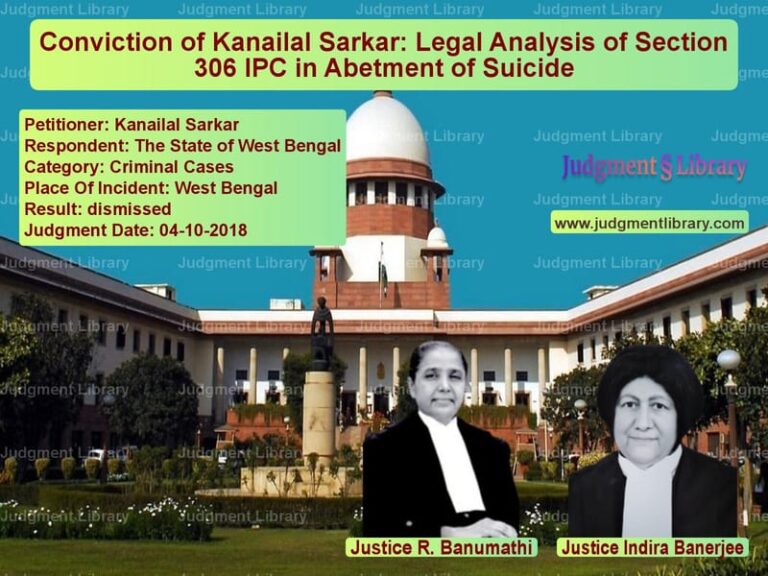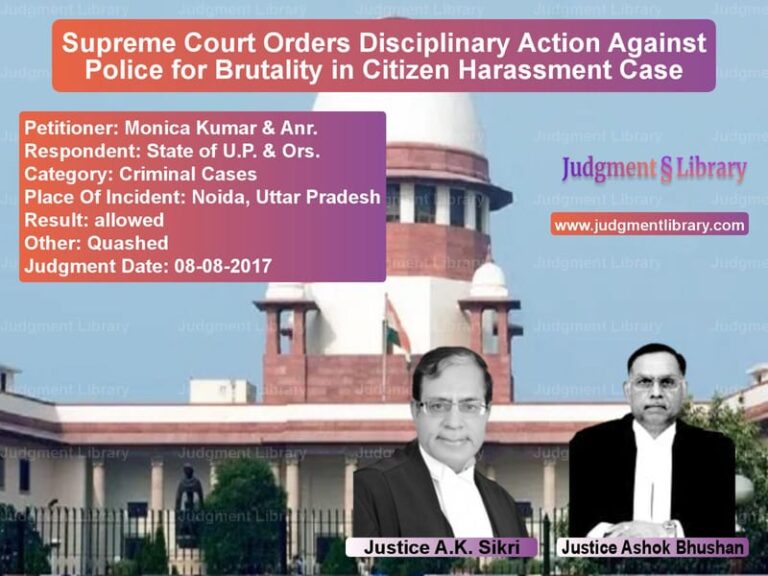Prison Reforms in India: Supreme Court Orders Action on Inhuman Jail Conditions
On 25th September 2018, the Supreme Court of India delivered a landmark judgment in Re: Inhuman Conditions in 1382 Prisons, addressing the **deplorable conditions in Indian prisons**. The case was initiated through **public interest litigation (PIL)** based on a letter received by the Court, highlighting concerns about **overcrowding, unnatural deaths, inadequate staffing, and violations of fundamental rights** in Indian jails.
The Supreme Court ruled that **prisoners are entitled to dignity and humane conditions**, directing the government to implement urgent reforms. The judgment reaffirmed the Court’s role in **upholding human rights**, particularly for marginalized sections, including prisoners.
Background of the Case
The case was initiated by the **Supreme Court suo motu**, based on a letter from **former Chief Justice R.C. Lahoti**. The letter raised concerns about:
- Severe **overcrowding in jails**.
- A **high number of unnatural deaths** in custody.
- **Lack of adequate staff** in prisons.
- **Untrained personnel** managing jail administration.
Despite previous efforts at prison reform, including reports by the **Mulla Committee (1980-1983)** and the **Justice Krishna Iyer Committee (1987)**, the **State had failed to take meaningful corrective measures**. This prompted the Court to intervene and mandate systemic reforms.
Legal Issues and Key Questions
The Supreme Court examined several critical issues:
- Does **overcrowding in prisons** violate the **fundamental rights** of inmates under **Article 21** of the Constitution?
- How can the government **prevent unnatural deaths** in jails?
- What measures are required to **ensure adequate staffing** in prisons?
- Should there be **regular judicial oversight** of prison conditions?
Arguments by the Petitioner (Amicus Curiae)
The **Amicus Curiae** (appointed legal expert) submitted:
- Prisoners are **entitled to fundamental rights**, including dignity and humane treatment.
- Many jails have **occupancy rates exceeding 150-200%**, violating basic living standards.
- The **lack of medical facilities** in jails contributes to a **high number of unnatural deaths**.
- Judicial oversight is **non-existent**, allowing human rights violations to persist.
- The **Model Prison Manual (2016)** and previous committee recommendations have not been implemented.
Arguments by the Respondent (Government of India)
The Government of India, represented by the **Attorney General**, countered:
- Prison reform is **primarily a state subject**, and **each state must address these issues** separately.
- The **Model Prison Manual (2016)** provides guidelines for better jail conditions.
- **Budgetary constraints** hinder the immediate implementation of large-scale reforms.
- Steps have been taken to **increase legal aid** for prisoners.
- Efforts are being made to **reduce undertrial prisoners** through fast-track courts.
Supreme Court’s Observations
The Supreme Court, comprising **Justice Madan B. Lokur, Justice S. Abdul Nazeer, and Justice Deepak Gupta**, made strong remarks on the **State’s failure to uphold prisoners’ rights**.
The Court held:
“Public interest litigation has compelled this Court to consider issues relating to violation of human rights, disregard for Article 21, and the failure of the State to implement laws.”
On **overcrowding in jails**, the Court ruled:
“The prison system is operating at over 150% capacity in many states. It is the duty of the State to ensure that every prisoner is treated with dignity.”
On **unnatural deaths in custody**, the Court noted:
“Unnatural deaths, including suicides, custodial violence, and medical neglect, require urgent intervention. Mechanisms for prisoner welfare and grievance redressal must be implemented.”
On **lack of adequate staff**, the Court observed:
“The number of prison staff is grossly inadequate. This affects prison security and the rehabilitation process.”
Final Judgment
The Supreme Court issued the following **mandatory directions**:
1. Formation of a Supreme Court Committee on Prison Reforms: A three-member committee led by **Justice Amitava Roy (Retd.)** was constituted to review prison conditions.
2. Implementation of the Model Prison Manual (2016): All states were directed to **adopt the manual** within **six months**.
3. Reduction of undertrial prisoners: The government was instructed to **set up fast-track courts** to reduce the number of undertrials.
4. Prevention of unnatural deaths: States were ordered to **establish prison oversight committees** to investigate unnatural deaths.
5. Appointment of trained staff: The Court directed states to **recruit more prison personnel** and provide proper training.
Impact of the Judgment
This landmark judgment ensures **prisoners’ rights are protected** and that jails operate under **legal and humanitarian standards**. Key takeaways include:
- Legal protection for prisoners: The Court reaffirmed that **prisoners have fundamental rights** under Article 21.
- Government accountability: The judgment forces states to **improve prison conditions** and submit compliance reports.
- Reduction in undertrial population: Speedy trials will ensure **fewer innocent people remain behind bars** for extended periods.
- Judicial oversight: The creation of **prison oversight committees** will help monitor jail conditions and prevent abuse.
This ruling sets a **strong precedent** for **prison reforms in India**, ensuring that **prisoners are treated with dignity and fairness under the law**.
Petitioner Name: Re: Inhuman Conditions in 1382 Prisons.Respondent Name: State of India.Judgment By: Justice Madan B. Lokur, Justice S. Abdul Nazeer, Justice Deepak Gupta.Place Of Incident: India.Judgment Date: 25-09-2018.
Don’t miss out on the full details! Download the complete judgment in PDF format below and gain valuable insights instantly!
Download Judgment: Re Inhuman Conditio vs State of India Supreme Court of India Judgment Dated 25-09-2018.pdf
Direct Downlaod Judgment: Direct downlaod this Judgment
See all petitions in Fundamental Rights
See all petitions in Public Interest Litigation
See all petitions in Separation of Powers
See all petitions in Judgment by Madan B. Lokur
See all petitions in Judgment by S. Abdul Nazeer
See all petitions in Judgment by Deepak Gupta
See all petitions in allowed
See all petitions in supreme court of India judgments September 2018
See all petitions in 2018 judgments
See all posts in Constitutional Cases Category
See all allowed petitions in Constitutional Cases Category
See all Dismissed petitions in Constitutional Cases Category
See all partially allowed petitions in Constitutional Cases Category







